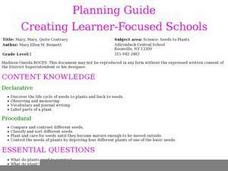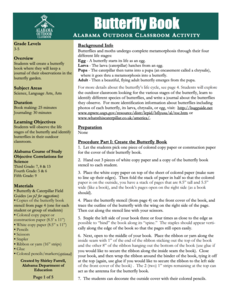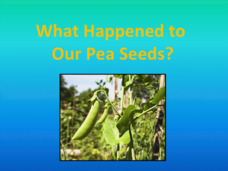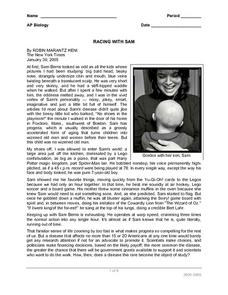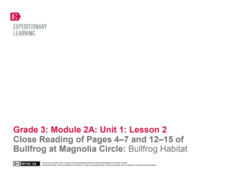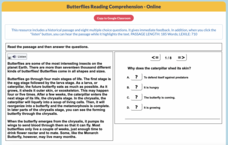Curated OER
Science: Seeds to Plants
First graders compare and contrast different seeds before planting them. They assess the basic needs to plants and conduct experiments of deprivation of those needs. They write stories and draw pictures of plants which are bound into a...
Curated OER
Paper Mache Caterpillar
Students read The Very Hungry Caterpillar by Eric Carle, and practice fine motor skills by using scissors and newsprint strips, and balloons to create paper mache caterpillars.
Curated OER
Harvesting and Threshing the Seed
Students harvest and thresh the seeds. They count the seeds and compare that number with the original number of seeds planted (8) to determine their profit or loss. Finally, students think about additional questions they have about...
PBS
Blow the Roof Off!
Blow the minds of young scientists with this collection of inquiry-based investigations. Based on a series of eight videos, these "hands-on, minds-on" science lessons engage young learners in exploring a wide range of topics from making...
Howard Hughes Medical Institute
Viral DNA Integration
How do reverse transcriptase inhibitors work? Young virologists examine the function of azidothymidine, a drug doctors use to treat HIV patients, during a hands-on modeling activity. Groups create a strand of DNA from an HIV RNA strand...
National Wildlife Federation
Penguin Fun Facts
What's black and white and can dive up to 1,800 feet under water? That's right, penguins! Learn this and many other amazing facts about these unique birds with this handy reference sheet.
GiggleUp Kids
Happy Little Farmer
Pre-readers and primaries can help farmer rabbit to plant some delicious fruits and vegetables. From soil preparation and pest control, all the way to the harvest, little ones participate in the entire process!
Alabama Wildlife Federation
Butterfly Book
Journaling is a great tool for processing information. Budding scientists build their own butterfly journals from their observations in a butterfly garden. The instructional activity challenges them to identify different stages of the...
Healthy Native Youth
Chapter 2: Learning About Adolescence
The Native American symbol, The Circle of Life, represents life's spiritual, physical, mental, and emotional well being. By way of deep discussion, and two games, the lesson uses the Circle of Life to explore the stages of maturity,...
Primary Resources
What Plants Need to Grow
What do seeds need in order to grow into plants? This presentation follows what happened every four days during a seed growth and observation study. Images compare how well two sets of seeds did under specific circumstances. Use this to...
Dr. Panda
Dr. Panda's Veggie Garden
Friends arrive at the farm and aspiring agronomists help the farmer to grow what the friends want. With adorable animation and charming background music, little ones practice virtual gardening and farming while developing cognitive...
University of Southern California
Mastering Microbes
Small but mighty! Learners explore the role of microbes in a healthy ecosystem. An engaging lesson asks pupils to design an aquaponics system that demonstrates that healthy microbes are necessary to maintain the ecosystem.
Minnesota Department of Natural Resoures
Tree Life
The life of a tree is the focus of a packet consisting of several activities all covering a different subject. Second graders measure shadows, make pinecone critters, write poems, count rings, complete a word search, play tree tag, and...
Curated OER
Aerobic/Anaerobic Respiration
Both aerobic and anerobic respiration are introduced in this succinct PowerPoint. The chemical equations for both are included. The last slides give instructions for a lab activity in which pupils use a gas sensor to measure the...
American Physiological Society
What Environmental Conditions Lead to the Hatching of Brine Shrimp?
Will changing the environment in which brine shrimp live impact their reproductive success? Young scientists get hands-on experience studying the habitat of brine shrimp in a two-week immersion lesson. The teacher's guide provides all of...
Alabama Wildlife Federation
How Many Butterflies
Learners become butterflies to complete an activity that has them collect tokens that represent food, water, and shelter. They must collect their necessities while in competition with other butterflies in the same area. Once the...
Curated OER
Racing with Sam
This assignment begins with an 8-page article about Sam Berns, a young man who suffers the rare genetic disease called progeria. Progeria is caused by a gene mutation and manifests itself as rapid premature aging. When your biology class...
Curated OER
The Gopher Tortoise
Can you believe the gopher tortoise was around when the dinosaurs were walking the Earth. Learn all about this creature that is one of Florida's most popular reptiles. Hands-on-activities and a glossary full of scientific terms make this...
University of Minnesota
Manduca sexta Wax Model
Caterpillars' and moths' most obvious change is physical, but what happens to their nervous systems as they complete metamorphosis? Through a hands-on investigation, young scholars construct the nervous system of a caterpillar. They then...
EngageNY
Close Reading of Pages 4 - 7 and 12 - 15 of Bullfrog at Magnolia Circle: Bullfrog Circle
Scholars take part in a close reading of pages four through seven and 12-15 of the book, Bullfrog at Magnolia Circle: Bullfrog Circle by Deborah Dennard. Readers identify the story's main idea, list its key details, and examine...
Purdue University
Reptiles, Amphibians, and the Scientific Method
What do a reptile and an amphibian have in common? A three-part lesson allows scholars to investigate the similarities and differences between the two types of animals by identifying specific body parts. The lesson highlights the...
Alabama Wildlife Federation
Bloomin' Butterflies
Get an up close and personal look at the metamorphosis of the butterfly. Pupils take ownership of their learning by collecting butterfly eggs, building a cage, and raising them to adulthood. The lesson resource provides instructions for...
Mr. Nussbaum
Butterfly
An interactive challenges scholars to read a short informational text about butterflies then answer eight questions. A progress report appears after the last question.
Curated OER
Intermediate Activity: Energy Guide Labels
High schoolers explore energy efficient appliances. In this economics and ecology lesson, students compare and analyze EnergyGuide labels of various appliances. High schoolers discuss federal government involvement with consumer...
Other popular searches
- Butterfly Life Cycle
- Frog Life Cycle
- Fish Life Cycle
- Life Cycle of Frogs
- Life Cycle of Stars
- Life Cycle of a Butterfly
- Animal Life Cycles
- Frog Life Cycle Worksheet
- Family Life Cycle
- Pumpkin Life Cycle
- Butterfly Life Cycle Video
- Life Cycle Chicken Embryo


